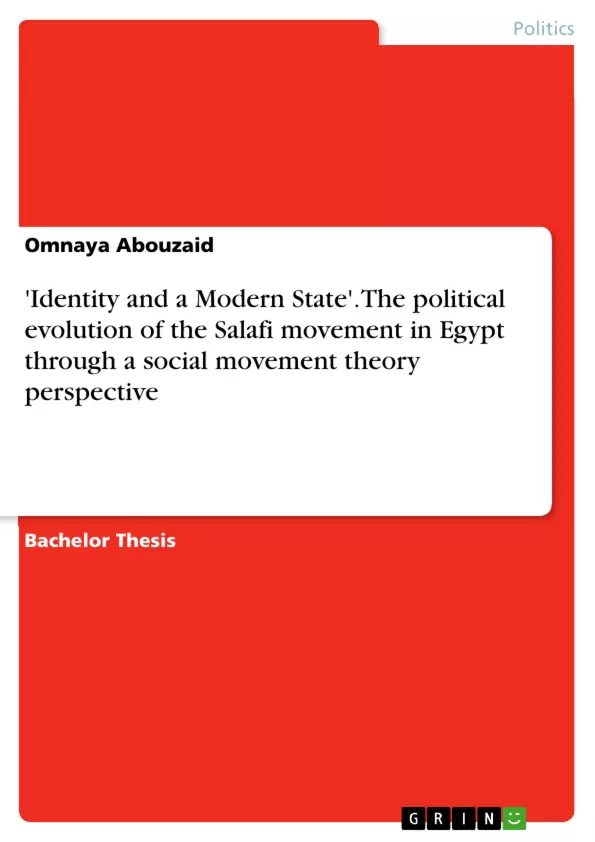'Identity and a Modern State' was the official slogan adopted by the first Salafi Al-Nour party during the Egyptian revolution of 2011. This remarked only as the beginning to the politicization process of the Salafi orientation in Egypt. On July 3 2013, however, the military intervened and deposed the Muslim Brotherhood’s Mohamed Morsi, the first elected Islamist president in a modern Egyptian discourse.
This research study will focus on the reasons why Egyptian Salafis have integrated themselves into politics in the first place using the components of political opportunity theory as a conceptual framework of the study.
Inhaltsverzeichnis (Table of Contents)
- Introduction
- Review of Literature
- Conceptual Framework
- Outline of Study
- Chapter One: The Influential Quietists
- From theory to practice
- Chapter Two: From Quietism to Activism
- From Theory to Practice
- Chapter Three: The Call at crossroads
- From Theory to Practice
- Concluding Remarks
Zielsetzung und Themenschwerpunkte (Objectives and Key Themes)
This research study aims to explore the reasons behind the Egyptian Salafi movement's integration into politics. It will analyze the Salafi discourse during the 2011 Egyptian revolution and consider the role of political opportunity in their decision to participate in the political sphere.
- The Salafi movement's theological mission and its connection to political power.
- The impact of the 2011 revolution on Salafi political participation.
- The role of political opportunity in shaping the Salafi movement's integration into politics.
- The interplay between Salafi ideology and practical political considerations.
- The influence of the Muslim Brotherhood on Salafi political strategies.
Zusammenfassung der Kapitel (Chapter Summaries)
The first chapter examines the "quietist" phase of the Salafi movement in Egypt, exploring their initial reluctance to participate in politics. The chapter delves into the historical context of Salafi thought and discusses how the Salafi movement viewed political involvement during this period. The chapter also explores the theoretical framework of the Salafi movement, highlighting its core beliefs and principles.
The second chapter examines the shift in Salafi thinking that led to their increased political activism. This chapter analyzes the factors that influenced this shift, including the impact of the Egyptian revolution and the perceived threat of the Muslim Brotherhood. The chapter also explores how Salafis began to engage in political discourse and action, highlighting their efforts to establish a political presence.
Chapter three focuses on the Salafi movement's political strategy during the aftermath of the revolution. This chapter discusses the challenges and opportunities faced by the Salafi movement in a rapidly changing political landscape. It examines the Salafi movement's evolving position on political participation, highlighting their efforts to navigate the complexities of democratic politics in Egypt.
Schlüsselwörter (Keywords)
The main keywords and focus topics of this work include: Salafi movement, Egyptian politics, political opportunity theory, Islamism, Muslim Brotherhood, 2011 Egyptian revolution, Sharia, political discourse, and ideological change.
Frequently Asked Questions
Why did the Egyptian Salafi movement enter politics in 2011?
The 2011 revolution created a 'political opportunity' where the fall of the Mubarak regime and the rise of the Muslim Brotherhood forced Salafis to organize politically to protect their identity and influence the new state.
What is the difference between Salafi 'Quietism' and 'Activism'?
Quietists traditionally avoid political involvement, focusing on religious purity and education. Activists believe that political participation is necessary to implement Sharia and defend Islamic values.
What was the Al-Nour party's slogan?
The official slogan was 'Identity and a Modern State', reflecting the attempt to reconcile traditional Salafi Islamic identity with the structures of a modern political system.
How did the Muslim Brotherhood influence Salafi strategy?
The Salafis often saw the Brotherhood as both a model for mobilization and a competitor. The Brotherhood's perceived failures and eventual deposition in 2013 significantly impacted Salafi political decisions.
What is Political Opportunity Theory?
It is a sociological framework suggesting that social movements emerge or change when the political environment provides new openings, such as a decrease in state repression or shifts in elite alliances.
- Quote paper
- Omnaya Abouzaid (Author), 2016, 'Identity and a Modern State'. The political evolution of the Salafi movement in Egypt through a social movement theory perspective, Munich, GRIN Verlag, https://www.grin.com/document/337164



